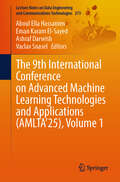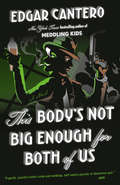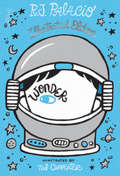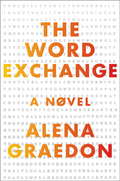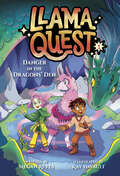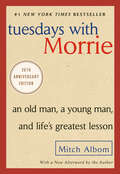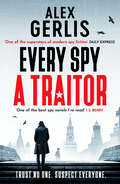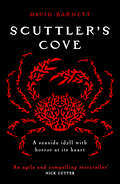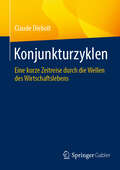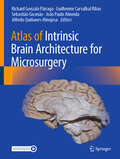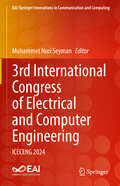- Table View
- List View
AI-Mediated Language Education in the Metaverse Era (Chinese Language Learning Sciences)
by Yu-Ju Lan Grace Yue Qi Dorothy ChunThis book provides open discussions and dialogues around the latest research and development on applying AI and ubiquitous technologies into various language learning contexts. Living in the Metaverse era, arguably a turning point in the evolution of the Internet, it is vital for researchers and practitioners to rethink and reconsider human and AI relationships in transforming the way we teach, learn, and live in everyday life. Reinders et al. (2022) amongst Computer Assisted Language Learning (CALL) researchers have emphasised the need to conduct more research on language learning in the classroom and beyond that makes real connections with what language learners do for their learning today. More importantly, language educators must find ways to support language learning in this new era. What is urgently needed is a consolidation and synthesis of theoretical foundations, visions and the latest research findings and practices on the integration of AI and ubiquitous technologies and language education from diverse perspectives. This book, comprising of contributions regarding contextualised AI-mediated language learning and teaching, provides researchers, practitioners, and teacher educators with an opportunity to closely engage in research-informed practices and intellectual dialogues on potential opportunities and challenges in the Metaverse era. It also helps to facilitate the development of equitable, sustainable, and just practices for the diversity of language learners today.
Anger in Politics: An Analysis of Anger from Aristotle to Today
by Andrew HertzoffAnger is everywhere today. Why is there so much anger in our politics? Why do some things feed unreasonable rage, and other outrageous things fail to provoke outrage? What should we be angry about and how? Some see anger as a toxic force endangering political debate, democracy, and civil society; others see anger as a the only proper motivation to pursue injustice. In this debate, Hertzoff offers considerations grounded in Aristotle&’s treatment of anger. When, why, and in what ways we become angry need to be judged against a standard of virtuous anger, measured against concepts of justice, dignity, and nobility. In bringing together Aristotle&’s concept and treatment with our concerns with anger in our society gives us reason to rethink our views of anger, how we learn to be angry, and how we teach children to be angry properly .
The Comprehensive Atlas of Robotic Urologic Surgery: A Step-by-Step Guide to Adult and Pediatric Urologic Procedures
by Li-Ming Su Jason P. Joseph Christopher E. BayneThis third edition atlas provides the most current techniques and methods for treating both benign and malignant urologic conditions using the most modern robotic platforms and equipment available to date. Robotic surgery has had a very well-established and increasing role in the field of urology for the past two decades, in many cases almost completely replacing traditional open and laparoscopic approaches. Robotic surgery has continued to expand and has been applied to urologic conditions in both adult and pediatric patients. In addition, advancements in robotic technology have opened the door to single-site (vs multi-port) surgeries, further reducing the morbidity and improving the cosmesis for many urologic procedures. The book begins with a guide to getting started in robotic surgery with new chapters on robotics training and performance improvement. From here, the book comprehensively and systematically covers a wide range of surgical procedures, including surgeries of the upper and lower urinary tract using the daVinci Xi platform, robotic pediatric urologic surgeries, and single port (daVinci SP) robotic surgery. A discussion of the past, present, and future of robotic surgical platforms wraps up this comprehensive guide. Each chapter is written by internationally-recognized leaders in the field in a consistent step-by-step format to help the audience learn how to expand their robotic surgical techniques and capabilities for their patients. The Comprehensive Atlas of Robotic Urologic Surgery, Third Edition is a singular resource for individuals who are involved in robotic surgery including urologic surgeons, trainees, nurses, physician assistants, and anesthesiologists.
Bildungsmanagement in Dezentralität und Wandel (Berufspädagogik & Bildungsmanagement #1)
by Prof. Dr. Thomas Hanstein Prof. Dr. Andreas LanigDieses Buch veranschaulicht, wie dezentrale Bildungsstrukturen unterstützt werden können, um organisationale Prozesse zu optimieren und die ganzheitliche Persönlichkeitsentwicklung von Lehrenden und Lernenden zu fördern. Es bietet praxisnahe Einblicke in Modelle, Konzepte und Methoden, um Lernräume reflektiert, partizipativ und inspirierend zu gestalten. Durch Analysen, Fallstudien und methodische Vorschläge entsteht ein tragfähiger kollegialer Erfahrungsaustausch. Der Sammelband schlägt eine Brücke zwischen Schule, Hochschule und Bildungseinrichtungen des tertiären Sektors, um systemische und fachdidaktische Perspektiven zu reflektieren und zu verbinden. Dabei wird ein besonderes Augenmerk auf die Rolle von Lehrenden und Lernenden als interne Impulsgeber:innen und Gestalter:innen gelegt.
Doulas in der Deutschschweiz - zwischen Beruf und Berufung: Eine religionswissenschaftliche Ethnographie über Geburtsbegleiterinnen (Veröffentlichungen der Sektion Religionssoziologie der Deutschen Gesellschaft für Soziologie)
by Jill MarxerIn diesem Open-Access-Buch werden erstmalig Doulas – nicht-medizinische Geburtsbegleiterinnen – in der Deutschschweiz untersucht. Doulas begleiten gebärende Personen vor, während und nach der Geburt auf emotionaler Ebene. Diese religionswissenschaftliche Ethnographie leistet fundierte Einblicke in und Erkenntnisse zur Doulalandschaft in der Deutschschweiz und fokussiert Überzeugungen, Erfahrungen und Spannungsfelder. Erstmalig werden drei wissenschaftlich bisher kaum untersuchte Felder aufgezeigt: Doulas im alternativ-religiösen Feld, im jüdisch-orthodoxen Kontext und die Doulaarbeit im Asylkontext. Die Studie leistet einen wichtigen Beitrag zu einem bisher wesentlich unbekannten Forschungsfeld und bietet eine differenzierte Analyse der Doula, ihrer Bedeutung, ihren Beziehungen zur „natürlichen Geburt&“, zur Medikalisierung der Geburt und zu religiösen Einstellungen. Zudem werden bis heute oft marginalisierte Perspektiven gebärender Personen und ihre Care-Umgebung beleuchtet.
The 9th International Conference on Advanced Machine Learning Technologies and Applications (Lecture Notes on Data Engineering and Communications Technologies #273)
by Ashraf Darwish Vaclav Snasel Aboul Ella Hassanien Eman Karam El-SayedThis volume showcases transformative AI research addressing real-world challenges across healthcare, education, law, and digital security. Highlights include explainable deep learning for berry classification, AI-driven communication skill assessment in virtual interviews, and Arabic legal judgment prediction systems. From Quran recitation tools for children and retinal disease diagnosis to DeepFake detection, post-quantum cryptography, and socio-economic impact modeling, these works reflect AI&’s growing role in building a smarter, safer, and more inclusive future.
This Body's Not Big Enough for Both of Us: A Novel
by Edgar Cantero"Joss Whedon...can&’t possibly write All The Things That Are Kind Of Like This. So hallelujah that Edgar Cantero – a Barcelona native whose first language is Spanish, but who spits pop-culture in English like the savviest geek in, say, Sheboygan posting on Tumblr – is writing some of them.&”--The Austin ChronicleFrom the New York Times bestselling author of Meddling Kids comes a mind-blowing, gender-bending, genre-smashing romp through the entire pantheon of action and noir. It is also a bold, tautly crafted novel about family, being weird, and claiming your place in your own crazy story. In a dingy office in Fisherman's Wharf, the glass panel in the door bears the names of A. Kimrean and Z. Kimrean. Private Eyes. Behind the door there is only one desk, one chair, one scrawny androgynous P.I. in a tank top and skimpy waistcoat. A.Z., as they are collectively known, are twin brother and sister. He's pure misanthropic logic, she's wild hedonistic creativity. The Kimreans have been locked in mortal battle since they were in utero...which is tricky because they, very literally, share one single body. That's right. One body, two pilots. The mystery and absurdity of how Kimrean functions, and how they subvert every plotline, twist, explosion, and gunshot--and confuse every cop, neckless thug, cartel boss, ninja, and femme fatale--in the book is pure Cantero magic. Someone is murdering the sons of the ruthless drug cartel boss known as the Lyon in the biggest baddest town in California--San Carnal. The notorious A.Z. Kimrean must go to the sin-soaked, palm-tree-lined streets of San Carnal, infiltrate the Lyon's inner circle, and find out who is targeting his heirs, and while they are at it, rescue an undercover cop in too deep, deal with a plucky young stowaway, and stop a major gang war from engulfing California. They'll face every plot device and break every rule Elmore Leonard wrote before they can crack the case, if they don't kill each other (themselves) first. This Body's Not Big Enough for Both of Us is a brilliantly subversive and comic thriller celebrating noir detectives, Die Hard, Fast & Furious, and the worst case of sibling rivalry, that can only come from the mind of Edgar Cantero.
Wonder: Illustrated Edition (Wonder)
by R. J. PalacioA beautiful, color illustrated edition of the #1 New York Times bestseller, Wonder, with a new afterword from the author. Experience the extraordinary story that inspired the Choose Kind movement, like never before.August Pullman was born with a facial difference that, up until now, has prevented him from going to a mainstream school. Starting 5th grade at Beecher Prep, he wants nothing more than to be treated as an ordinary kid--but his new classmates can't get past Auggie's extraordinary face. WONDER, now a #1 New York Times bestseller and a blockbuster hit, begins from Auggie's point of view, but soon switches to include his classmates, his sister, her boyfriend, and others. These perspectives converge in a portrait of one community's struggle with empathy, compassion, and acceptance. This beautiful, color illustrated edition includes over twenty-five pieces of original art from Tad Carpenter, the artist behind the original cover. It also includes an essay from R.J. Palacio reflecting on ten years of Wonder and an introduction by Dina Zuckerberg, director of family programs at myFace, a non-profit dedicated to supporting the craniofacial difference community. Experience this extraordinary story like never before.
The Word Exchange: A Novel
by Alena GraedonA dystopian novel for the digital age, The Word Exchange offers an inventive, suspenseful, and decidedly original vision of the dangers of technology and of the enduring power of the printed word. In the not-so-distant future, the forecasted &“death of print&” has become a reality. Bookstores, libraries, newspapers, and magazines are things of the past, and we spend our time glued to handheld devices called Memes that not only keep us in constant communication but also have become so intuitive that they hail us cabs before we leave our offices, order takeout at the first growl of a hungry stomach, and even create and sell language itself in a marketplace called the Word Exchange. Anana Johnson works with her father, Doug, at the North American Dictionary of the English Language (NADEL), where Doug is hard at work on the last edition that will ever be printed. Doug is a staunchly anti-Meme, anti-tech intellectual who fondly remembers the days when people used email (everything now is text or videoconference) to communicate—or even actually spoke to one another, for that matter. One evening, Doug disappears from the NADEL offices, leaving a single written clue: ALICE. It&’s a code word he devised to signal if he ever fell into harm&’s way. And thus begins Anana&’s journey down the proverbial rabbit hole . . . Joined by Bart, her bookish NADEL colleague, Anana&’s search for Doug will take her into dark basements and subterranean passageways; the stacks and reading rooms of the Mercantile Library; and secret meetings of the underground resistance, the Diachronic Society. As Anana penetrates the mystery of her father&’s disappearance and a pandemic of decaying language called &“word flu&” spreads, The Word Exchange becomes a cautionary tale that is at once a technological thriller and a meditation on the high cultural costs of digital technology.
Llama Quest #1: Danger in the Dragons' Den (Llama Quest)
by Megan ReyesStart your quest with a talking purple llama and protect the Kingdom of Ravenwood! Join eight-year-old Dak as he's swept into a magical adventure to protect the people and creatures of their kingdom—including dragons!Eight-year-old Dak spends his days scooping llama poop and dreaming of adventure. Then he meets Fenn, the mysterious girl who lives next to his family&’s farm, and Lucy, a llama…who wears a scarf? And talks? And turns PURPLE?!Suddenly Dak is on a magical whirlwind adventure! Turns out Lucy is the keeper of the magical stones that protect the people of Ravenwood —and a thief has tried to steal them. Now they're scattered across the kingdom! The good news? Lucy has found the Fire Stone. The bad news? A family of dragons found it first and they won&’t give it up easily. Can Dak, Fenn, and Lucy get the Fire Stone back? They&’ll encounter magical creatures, a sneaky thief, and tricky magic, but when Dak, Fenn, and Lucy work together, nothing can beat Team Llama Quest! Join Team Llama Quest on all their adventures! #1 Danger in the Dragons' Den#2 Secrets of Starfall Forest
Tuesdays with Morrie: An Old Man, a Young Man, and Life's Greatest Lesson, 25th Anniversary Edition
by Mitch Albom#1 NEW YORK TIMES BESTSELLER • A special 25th anniversary edition of the beloved book that has changed millions of lives with the story of an unforgettable friendship, the timeless wisdom of older generations, and healing lessons on loss and grief—featuring a new afterword by the author &“A wonderful book, a story of the heart told by a writer with soul.&”—Los Angeles Times &“The most important thing in life is to learn how to give out love, and to let it come in.&” Maybe it was a grandparent, or a teacher, or a colleague. Someone older, patient and wise, who understood you when you were young and searching, helped you see the world as a more profound place, gave you sound advice to help you make your way through it. For Mitch Albom, that person was his college professor Morrie Schwartz. Maybe, like Mitch, you lost track of this mentor as you made your way, and the insights faded, and the world seemed colder. Wouldn&’t you like to see that person again, ask the bigger questions that still haunt you, receive wisdom for your busy life today the way you once did when you were younger? Mitch Albom had that second chance. He rediscovered Morrie in the last months of the older man&’s life. Knowing he was dying, Morrie visited with Mitch in his study every Tuesday, just as they used to back in college. Their rekindled relationship turned into one final &“class&”: lessons in how to live. &“The truth is, Mitch,&” he said, &“once you learn how to die, you learn how to live.&”Tuesdays with Morrie is a magical chronicle of their time together, through which Mitch shares Morrie&’s lasting gift with the world.
Plenty of Love To Go Around
by Emma Chichester ClarkThere&’s a new pet in town! Based on the adventures of Emma Chichester Clark&’s real-life dog, Plum, this delightful romp gently tackles feelings of jealousy and the difficulties of sharing, in endearing, dynamic illustrations that readers will love. Plum the dog loves being her family&’s Special One. So when Binky the cat moves in next door and everyone showers him with attention, Plum feels left out. Cats are not her favorite thing! Binky follows Plum everywhere, even to the park, which everyone knows is not for cats. And on top of that, Binky is so annoyingly clever. Is he the new Special One? Or is there enough love for both of them?
Fiend
by Alma KatsuHistorical horror maven Alma Katsu turns her talents to the modern world for the first time, in this terrifying tale about an all-powerful family with an ancient evil under its thumb.Imagine if the Sackler family had a demon at their beck and call.The Berisha family runs one of the largest import-export companies in the world, and they&’ve always been lucky. Their rivals suffer strokes. Inconvenient buildings catch on fire. Earthquakes swallow up manufacturing plants, destroying harmful evidence. Things always seem to work out for the Berishas. They&’re blessed.At least that is what Zef, the patriarch, has always told his three children. And each of them knows their place in the family—Dardan, as the only male heir, must prepare to take over as keeper of the Berisha secrets, Maris&’s most powerful contribution, much to her dismay, will be to marry strategically, and Nora&’s job, as the youngest, is to just stay out of the way. But when things stop going as planned, and the family blessing starts looking more like a curse, the Berishas begin to splinter, each hatching their own secret scheme. They didn&’t get to be one of the richest families in the world without spilling a little blood, but this time, it might be their own.
Every Spy a Traitor (Double Agent series)
by Alex GerlisA Financial Times Best Book of 2024'One of the superstars of modern spy fiction' Daily Express'One of the best spy novels I've read' I. S. Berry, author of The Peacock and the Sparrow'Gerlis is at the top of his game' Paul Vidich, author of Beirut StationTrust no one. Suspect everyone.It's 1937. Fear and suspicion stalk the Continent. A million have died in Stalin's Great Purge and the Nazi terror grips Germany. But British intelligence is still trying to work out who the enemy is.As Europe heads towards war, treason is in the air. British spymasters know there is one Soviet agent in their ranks, codenamed Agent 'Archie', and there's a frantic search to find them. What they don't know is that he is not the only traitor.The life of Charles Cooper, a young British writer travelling Europe to research his novel, is about to change for everThe thrilling first novel in Alex Gerlis' new Double Agent espionage series, perfect for fans of Charles Cumming and Mick Herron.'Fascinating... A pleasant blend of John Buchan derring-do if lightweight adventures and the more gritty Le Carr-like grey travails in the secret corridors of power' Maxim Jakubowski, Crime Time'Clever plotting, rich detail and a compelling story of a young man forced to become a double agent to survive in a world where friends become adversaries and no one can be trusted.Every Spy a Traitor will reward fans of Graham Greene, Charles Cumming, Frederick Forsythe and Alan Furst' Paul Vidich, author of Beirut Station'An absorbing portrait of a world on the brink that disarms you before it floors you' Tim Glister, author of Red Corona'With this brilliant tale of a writer entangled in pre-World War II espionage, Gerlis cleverly builds an ironic and darkly realistic world that shows just how nebulous is the border between good and evil, observer and participant, our inner and outer lives. Richly imagined, meticulously plotted, and chockfull of historic details, Every Spy a Traitor is one of those rare books that gets better with every page. One of the best spy novels I've read' I. S. Berry, author of The Peacock and the Sparrow
Who Ate My Book? (Penguin Young Readers, Level 2)
by Tina KüglerSomeone is taking bites out of this book! And we have a feeling a certain mischievous goat has something to do with it... now with a fresh look!A goat is on the loose and is taking bites out of everything, even the pages of this book! Join in on the fun and the mystery in this story perfect for early readers.
The Convict's Wife: A heart-wrenching and emotional 1800s northern saga (Lancashire Girls)
by Libby AshworthCan she keep her family together?When Molly Holden's husband, Thomas, is convicted in 1812 of being a Luddite on the word of a secret informer, he is sentenced to be transported to Australia. Left with their baby daughter, Molly must find work to survive.But the man who informed on Thomas is a former suitor of Molly's, and Isaac believes that with Thomas out of the way she will return to him Yet Molly is determined to join her husband and find a way to pay for passage, all the while trying to stay one step ahead of Isaac's nefarious interferences. But will it be enough to cross the ocean and be reunited with her beloved Thomas?Based on real events, this is an inspiring Lancashire saga of one woman's journey of love, family and survival. Perfect for fans of Dilly Court, Kitty Neale and June Francis.Praise for The Convict's Wife 'For all Saga fans this book is a must! I found it to be an extremely good and totally absorbing read, particularly as it is based on fact. I particularly warmed to Molly, a typical "Lancashire lass". Her sheer determination was so commendable and heart warming. A thoroughly satisfying read, I will look forward to Libby's next novel.' LYN ANDREWS, author of The Girls from Mersey View'A beautifully crafted saga, that kept me enthralled by Molly's love and faithfulness to her husband. A wonderful, fireside read, filled with hope and determination, just what we need in these hard times.' DIANE ALLEN, author of For the Sake of Her Family'An exciting tale of love, intrigue and family ties set in 1812 that moves between Bolton and Australia. I look forward to reading Libby's next book in the series.' LINDA FINLAY, author of The Farringdon's Fate series'Using her vast local knowledge and research, and her gift for transforming real history into page-turning drama, this is a captivating opener to what promises to be an exciting new series.' Lancashire Post
A Call to Service: An engrossing, powerful and heart-breaking WW2 novel (Women of the Resistance)
by Holly GreenHer country needs her. But her heart is elsewhere.After fleeing German-occupied Paris, Alix is back in her home in Belgrade, hoping to finally reunite with her parents. But while Alix has been fighting her own battles with the Resistance, her parents have too fled with King Peter to ensure his safety. As Alix decides to find her parents with her father's deputy steward, Drago, they are derailed and forced to reside in the Serbian country home.But all is not lost when Alix finds Nikola in the city - the man her father said she was to marry before war broke out. She finds she has more in common with him than ever expected, and together with Drago they join a new Resistance.But Alix hasn't forgotten about Steve, the handsome American pilot she fell in love with back in France, whom she last heard was harmed in battle. When a chance meeting brings Alix and Steve face to face once again, she must decide where her heart truly isFans of Suzanne Kelman and Fiona Valpy will love this captivating, globe-trotting, deeply rich historical fiction set in World War Two.Readers are loving A Call to Service:'A wonderful story of romance, adventure, and resistance. I can't wait to read the next book! I want more!' Reader Review'This was such a great historical book. I absolutely loved the story it was very well researched and the pacing was great!' Reader ReviewPraise for Holly Green:'So well written felt so real. Everything about it made for a great read. I recommend this and give it 5 stars.' Reader Review'A fantastic story The characters capture your attention right from the very first page.' Reader Review'The story had me hooked from the beginning highly recommend' Reader Review'Great book by this author felt like I was in the story' Reader Review'A brilliantly written and well researched book.' Reader Review'Holly's storytelling is amazing, you feel you are actually there.' Reader Review'Holly Green's research and delivery of her stories gives readers a glimpse of the reality of war.' Reader Review
Scuttler's Cove: A chilling, unputdownable folk horror thriller
by David Barnett'A brooding tale from the murky depths below the English idyll. Coastal-horror at its finest' Matt WesolowskiThe sea never forgets. The sea never forgivesScuttler's Cove is a working village, nestling in dramatic coastal scenery in Cornwall, where life has gone on uninterrupted for centuries until this seaside idyll was discovered by the rich.Now the quaint harbour-front cottages have been snapped up by second-homers and rental companies, and the locals can barely afford to live in their own town.It is a very different place for Merrin Moon, who left for university at the age of eighteen and never looked back. Now in her thirties, she returns to the Cove for the first time since, after the death of her mother.She soon discovers that there are forces at play in the village that she could never have imagined. Is someone trying to drive out the second homers? And has their arrival started a chain of events none of them will be able to stop?For something old and terrible is awakening beneath the town's hallowed ground. And with it comes a horror that the residents have fought for generations to keep a secret.A dark and mysterious folk horror of the sea, and a timely exploration of the displacement of our modern moment, with a twist that will leave you reeling.Praise for Scuttler's Cove 'There's a rich vein of horror to be mined here, and Barnett's doing a great job of excavating it' SFX'An eerie tale of folk horror, as old gods and locals with age-old roots come into conflict with new money and the modern world, with a satisfying supernatural showdown, and a twist you won't see coming' Jane Johnson'Swarming spiders, vicious crabs, fish-headed revenants ... these are terrifying enough, but they're also the least scary things in Scuttler's Cove. It's the people you have to watch out for... a brutal, brilliant novel of folk horror and dread' Tim Lebbon'It feels like a modern version of The Wicker Man, in the best possible way and with its own unique take' Reader review'Wow, just wow. David Barnett is my new go-to for folk horror' Reader review'Filled with great characters, a downright creepy unsettling narrative, and surprises in store which you won't see coming, this is a must-read folk horror novel' Reader review'Very well-written. Dark, compelling and atmospheric' Reader review'Folk horror at its finest leads to an intensely satisfying and fantastic ending that will have you actually cheering' Reader review'Another gem! Scuttler's Cove takes you on a wild ride of mystery, intrigue, and horrific folklore' Reader review'The bright, beachy atmosphere with a looming undercurrent of something dark and sinister kept the tension high I found myself itching to read more when I wasn't actively reading it' Reader review'I came for the crab on the cover, stayed for the folk horror a timely and atmospheric horror novel' Reader review
A Simplified Approach to the Classical Laminate Theory of Composite Materials: Application of Bar and Beam Elements (Advanced Structured Materials #242)
by Andreas ÖchsnerThis book provides a systematic introduction to composite materials, which are obtained by a layer-wise stacking of one-dimensional bar/beam elements. Each layer may have different mechanical properties, but each single layer is considered as isotropic. The major idea is to provide a simplified theory to easily understand the classical two-dimensional laminate theory for composites based on laminae with unidirectional fibers. In addition to the elastic behavior, failure is investigated based on the maximum stress, maximum strain, Tsai-Hill, and the Tsai-Wu criteria. Partial differential equations lay the foundation to mathematically describe the mechanical behavior of any classical structural member known in engineering mechanics, including composite materials. The so-called classical laminate theory provides a simplified stress analysis, and a subsequent failure analysis, without the solution of the system of coupled differential equations for the unknown displacements. The procedure provides the solution of a statically indeterminate system based on a generalized stress–strain relationship under consideration of the constitutive relationship and the definition of the so-called stress resultants. This laminate theory is typically provided for two-dimensional plane problems, where the basic structural element is a simple superposition of a classical plane elasticity element with a thin plate element under the consideration of an orthotropic constitutive law. This two-dimensional approach and the underlying advanced continuum mechanical modeling might be very challenging for some students, particularly at universities of applied sciences. Thus, a reduced approach, the so-called simplified classical laminate theory, has been developed. The idea is to use solely isotropic one-dimensional elements, i.e., a superposition of bar and beam elements, to introduce the major calculation steps of the classical laminate theory. Understanding this simplified theory is much easier and the final step it to highlight the differences when moving to the general two-dimensional case.
Konjunkturzyklen: Eine kurze Zeitreise durch die Wellen des Wirtschaftslebens
by Claude DieboltIn einer Welt, die von Krisen, geopolitischen Spannungen und technologischen Umbrüchen geprägt ist, gewinnen Konjunkturzyklen neue Relevanz. Sie spiegeln nicht nur wirtschaftliche Schwankungen wider, sondern offenbaren tiefgreifende gesellschaftliche, institutionelle und politische Dynamiken. Dieses Buch lädt zu einer faszinierenden Reise durch Geschichte, Theorie und Empirie der Konjunkturforschung ein – von den klassischen Konzepten bis zu den Herausforderungen der Gegenwart. Im Dialog zwischen Statistik, historischer Analyse und theoretischer Modellierung zeigt sich: Konjunkturzyklen sind mehr als bloße Abweichungen vom Trend, sie sind Ausdruck historischer Zeit. Sie zu verstehen heißt, das Zusammenspiel von Struktur und Wandel zu erfassen – um ökonomisches Handeln in seiner Tiefe neu zu deuten.
Current Applications of Nanobiomaterials, Volume 1: Exploring Sustainable Synthesis, Characterization, and Therapeutic Innovations in Nanomedicine (Nanotechnology in the Life Sciences)
by Ram Prasad Krishnan Anand Karuppusamy Arunachalam Sathish Sundar Dhilip Kumar Sonaimuthu Mohandoss Zikhona Tywabi-NgevaBiomaterials play a vital role in medicine today, including restoring function and facilitating diagnosis and disease prevention. Biomaterial-based products consist of either natural or synthetic materials. Biomaterials derived from natural products can consist of materials such as proteins, polysaccharides, lipids, glycoproteins, lipoproteins, cellular matrix, and its components. These products may be used as alternatives to animal-derived and synthetic chemical products to develop new therapeutic and diagnostic approaches with greater eco-friendliness and sustainability, according to new research. They are also biocompatible, biodegradable, renewable, non-toxic, and capable of remodelling. Recently, scientists have been exploring the potential use of plant-based cellular matrix-based biomaterials for the treatment of various communicable and noncommunicable diseases, a trend that has attracted the attention of global biomedical research. Globally, there has been an increase in the need for more effective treatment and diagnostics as a result of the overwhelming disease burden in society. Current Applications of Nanobiomaterials, Volume 1 and Volume 2 together, outline the most widely used biomaterials derived from non-animal natural resources, such as plants, fungi, algae, and microbes, with a focus on novel therapeutic and diagnostic applications.
Atlas of Intrinsic Brain Architecture for Microsurgery
by João Paulo Almeida Guilherme Carvalhal Ribas Alfredo Quiñones-Hinojosa Richard Gonzalo Párraga Sebastião GusmãoThe advent of microneurosurgery has expanded our understanding of neurosurgical anatomy and enabled complex microsurgical procedures to be performed with greater safety and precision. More recently, diffusion tensor imaging (DTI) has provided a means to visualize major white matter tracts that are not discernible during direct surgical inspection. This comprehensive atlas enhances knowledge of the brain&’s three-dimensional microanatomy, which is critical for navigating surgical complexities while preserving important non-visible structures. The richly illustrated chapters feature detailed dissections of white matter tracts using Klingler&’s technique, presenting the intrinsic architecture of the brain, common microsurgical approaches, and case-based examples.Atlas of Intrinsic Brain Architecture for Microsurgery is an essential resource to help medical students, neurologists, neurosurgery residents, and neurosurgeons correlate the anatomy of cerebral white matter fibers with related pathologies and microsurgical approaches.
Lysosomes: Methods and Protocols (Methods in Molecular Biology #2976)
by Stephanie M. Hughes Indranil BasakThis volume provides a wide range of methods to discover and assess lysosome structure and function are provided. Chapters detail the essential methodologies and giving expert insight to key features with notes pertaining to key elements of the methods. Written in the highly successful Methods in Molecular Biology series format, the chapters include brief introductions to the material, lists of necessary materials and reagents, step-by-step, readily reproducible laboratory protocols, and a Notes section which highlights tips on troubleshooting and avoiding known pitfalls. Authoritative and cutting-edge, Lysosomes: Methods and Protocols aims to be comprehensive guide for researchers in the field.
3rd International Congress of Electrical and Computer Engineering: ICECENG 2024 (EAI/Springer Innovations in Communication and Computing)
by Muhammet Nuri SeymanThis proceedings presents the papers included in the 3rd International Congress of Electrical and Computer Engineering (ICECENG), which took place in Bandirma, Turkey, 27-30 November 2024. The conference aims to bring together researchers, developers, and students in computing, technology trends, artificial intelligence, and security who are interested in studying the application of formal methods to the construction and analysis of models describing technological processes at both micro and macro levels. ICECENG&’24 also aims to provide a platform for discussing the issues, challenges, opportunities, and findings of computer engineering research. The conference seeks to provide some answers and explore the processes, actions, challenges, and outcomes of learning and teaching.
Disquotale Gewinnausschüttungen und Einlagen: Steuerliche Würdigung und Gestaltungsmöglichkeiten (BestMasters)
by Leon HierathDieses Buch widmet sich, unter Einbezug der Auffassung der Finanzverwaltung, der Rechtsprechung sowie der Literaturmeinung, der Untersuchung, welche Voraussetzungen für die zivil- und steuerliche Anerkennung disquotaler Gewinnausschüttungen und Einlagen bestehen. Im Zuge dessen wird dargelegt, welche ertragsteuerlichen Folgen sich im Falle der Anerkennung sowie bei Versagung der disquotalen Gewinnausschüttungsabrede für den Steuerpflichtigen ergeben. Darüber hinaus werden disquotale Gewinnausschüttungen und Einlagen erbschaft- und schenkungsteuerlich beurteilt. Vor diesem Hintergrund sollen steuerliche Gestaltungsmöglichkeiten aufgezeigt und analysiert sowie einer kritischen Würdigung unterzogen werden.





